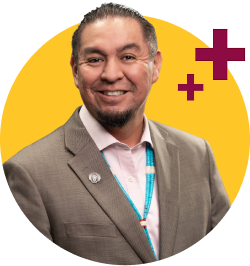
ASU Law Talks
What is a legal master’s degree in Tribal self-governance?

Derrick Beetso
Executive Director, Indian Gaming and Self-Governance; Professor of Practice
Beetso, a citizen of the Navajo Nation, earned his JD and Indian Law certificate through ASU Law’s Indian Legal Program. He previously served as general counsel for the National Congress of American Indians and has extensive experience in federal Indian law, Tribal self-governance and policy advising within the U.S. Department of the Interior.
A Tribal self-governance legal master’s degree is a graduate program offered through the Master of Legal Studies (MLS) program at the Sandra Day O’Connor College of Law at Arizona State University that teaches the laws, policies and leadership principles guiding Tribal Nations’ exercise of self-determination and self-governance. The program is flexible enough to include studies in Indian Gaming and civil jurisdiction in Indian Country, and designed for those seeking to advance their work in Indian Country or related fields without pursuing a Juris Doctor (JD) or taking the bar exam.
What is a Master of Legal Studies degree?
A Master of Legal Studies, or MLS, is designed for professionals who want to understand how the law shapes their field but don’t intend to practice law. Think of it as professional-level legal fluency without the full JD commitment. At ASU Law, the MLS can be completed in just 30 credit hours, either online or in person in Phoenix or Washington, D.C. Students have access to world-renowned faculty, flexible scheduling and over 20 emphasis areas—including the nation’s first programs focused specifically on Indian gaming and Tribal self-governance.
Why is Tribal self-governance such an important area of study?
Tribal self-governance is more than a policy—it’s the exercise of inherent sovereignty and the implementation of self-determination laws and regulations that compliment tribal sovereignty. It empowers Tribal Nations to design and administer programs that meet their communities’ needs, rather than relying on distant federal agencies and one-size-fits-all approaches. When Tribes control how resources are allocated, the results are more culturally grounded, efficient and sustainable. Professionals who understand the legal frameworks of self-governance play a crucial role in strengthening tribal sovereignty and improving outcomes in areas like health, education and economic development.
What can I do with an MLS focused on Tribal self-governance?
Graduates of the MLS program with this emphasis are well-positioned for leadership roles in:
- Tribal administration
- Government relations
- Policy development
- Compliance
Many serve as senior or mid-level executives for:
- Tribal governments
- Congressional staff
- Federal, state and local employees.
The degree also benefits professionals in fields such as health care, education and public service who interact with Tribal communities or navigate federal Indian law.
Do I need to be Native to earn this degree?
No, anyone can earn the MLS in Tribal self-governance. ASU Law welcomes all students who are passionate about working with or on behalf of Tribal communities. The Indian Legal Program (ILP) includes one of the largest groups of Native American students and faculty in the country, offering a rich environment for cross-cultural learning and collaboration.
How can I get started?
No LSAT or GRE is required. You can apply through ASU Law’s FastApp, which takes about 10 minutes. The MLS is a 30-credit-hour program at ASU Law, which is accredited by the American Bar Association (ABA). The degree is available full-time or part-time, online or on campus. Scholarships are also available through the Indian Legal Program, made possible through the generosity of the Yuhaaviatam of San Manuel Nation for students studying Indian gaming or Tribal self-governance.